|
|
|
Sort Order |
|
|
|
Items / Page
|
|
|
|
|
|
|
| Srl | Item |
| 1 |
ID:
142884
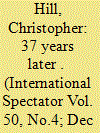

|
|
|
|
|
| Summary/Abstract |
In the early Spring of 2015 the United Kingdom lost two of its best experts on European integration – John Pinder and Roger Morgan. Both brought academic expertise and great practical judgement to their support for the European project from a starting-point which stressed the importance of persuading the nation states of the benefits of increased integration. As we approach a referendum on Britain’s continued membership – a strange and unnecessary affair for most of those without a political axe to grind – their voices will be greatly missed, not least as the new generation of EU experts in British universities is increasingly cosmopolitan in character. The debate over BREXIT in the UK requires informed indigenous voices if it is not to be overtaken by raucous extremism, but they are ever fewer in number.
|
|
|
|
|
|
|
|
|
|
|
|
|
|
|
|
| 2 |
ID:
142887
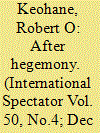

|
|
|
|
|
| Summary/Abstract |
The liberal international economic system established after the Second World War is currently in difficulty. Large fluctuations in exchange rates have led to calls for a “new Bretton Woods”. Protectionism has increased sharply on both sides of the Atlantic; the European Community, once a force for liberalization, now takes a leading role in imposing restrictions on trade. European and American discussions of the world economy are characterized less by thoughtful consideration of how joint action could relieve the current economic recession and reduce dangers of collapse, than by quarrelling over such issues as subsidies on pasta, alleged dumping of steel, and subsidized credit terms to the Soviet Union.
|
|
|
|
|
|
|
|
|
|
|
|
|
|
|
|
| 3 |
ID:
142888
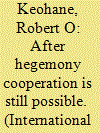

|
|
|
|
|
| Summary/Abstract |
This paper, which appeared in The International Spectator in January 1984, previewed many of the themes of my book, After Hegemony: Cooperation and Discord in the World Political Economy.1 I argued that the US had lost its hegemonic position in the world political economy: the ability to make and enforce the rules. Furthermore, its “egoism” would lead it to be less willing to invest in leadership or influence. Nevertheless, I argued, it was possible for cooperation to persist without hegemony – a major theme of my book, in response to others who argued that the collapse of American hegemony would usher in a new era of conflict.
|
|
|
|
|
|
|
|
|
|
|
|
|
|
|
|
| 4 |
ID:
142894


|
|
|
|
|
| Summary/Abstract |
In his 1988 essay, my late father, Yusif Sayigh, argued that the first Palestinian intifada had generated greater international understanding of the decades-long Palestinian struggle for national self-determination and support for the creation of an independent Palestinian state. This built on incremental shifts that had unfolded in response to diverse developments over the previous two decades, from the rise of the non-aligned movement in the 1970s, which helped secure a platform for the Palestine Liberation Organisation at the United Nations, to the grinding two-month Israeli siege of Beirut in 1982 and subsequent massacre of Palestinian refugees in the Sabra/Shatila camp. These developments galvanized Palestinians living under Israeli occupation in the West Bank, Gaza Strip, and East Jerusalem politically, and generated serious questioning of the feasibility of maintaining the occupation among many Israelis. But their cumulative impact was insufficient, in my father’s assessment, to bring about a decisive breakthrough in United States or, for that matter, in European policy.
|
|
|
|
|
|
|
|
|
|
|
|
|
|
|
|
| 5 |
ID:
142899


|
|
|
|
|
| Summary/Abstract |
The process of European integration is at a turning point. Recent discussions about the future of monetary union seem to suggest that progress towards further deepening of the European Union may be in question and that more than one model of Europe may develop in the future. It is against this background that an answer to the question this article asks should be sought.
|
|
|
|
|
|
|
|
|
|
|
|
|
|
|
|
| 6 |
ID:
142883


|
|
|
|
|
| Summary/Abstract |
The Community’s capacity for action is based mainly on three historic decisions taken in the decade leading up to 1962: to establish a common policy for the coal and steel industries through the common institutions set up in 1952 under the Treaty of Paris; to launch a general customs union in 1958 under the Treaty of Rome, together with common institutions for economic policy-making and to erect the system of common control of agricultural markets, through agreement on the common agricultural policy in 1962.
|
|
|
|
|
|
|
|
|
|
|
|
|
|
|
|
| 7 |
ID:
142905
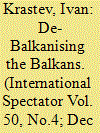

|
|
|
|
|
| Summary/Abstract |
More than a year after NATO intervention in Kosovo and the launching of the Stability Pact, Southeast Europe (SEE) still resembles a vast political laboratory. The region remains volatile, insecure and economically depressed. Support for democratic institutions is low, corruption is endemic, public expectations are pessimistic. There are clear differences from country to country, but on the whole, Southeast Europe continues to be characterised by weak states and both hard and soft protectorates.
|
|
|
|
|
|
|
|
|
|
|
|
|
|
|
|
| 8 |
ID:
142906


|
|
|
|
|
| Summary/Abstract |
In the year 2000, in the immediate aftermath of NATO’s military operation in former Yugoslavia, I wrote an article claiming that it would be the success of the reconstruction of the region that would define the historical legitimacy of NATO’s intervention, conducted in the absence of a UN Security Council resolution; that the internal weakness and dysfunctionality of the Balkan states were the major threat to the security of the region; and that neither democratisation nor European integration could be substitutes for proper state-building in the region.
|
|
|
|
|
|
|
|
|
|
|
|
|
|
|
|
| 9 |
ID:
142895
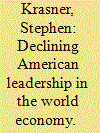

|
|
|
|
|
| Summary/Abstract |
For the last twenty or more years, international relations scholarship in the United States has been dominated by two competing research programs – liberalism and realism. Each of these programs has had many specific variations. The adherents of each perspective have disagreed among themselves as well as with those holding the other view. Each of these broad perspectives, however, shares basic assumptions about the nature of actors, the character of the international system and the prospects for cooperation. For liberalism there is a multiplicity of actors; cooperation is likely if not foreordained because these actors pursue absolute not relative goals; they function in a mixed-motive, not a zero-sum world. Order con emerge from the self-interested behavior of individuals, though international institutions might be necessary to facilitate cooperation under conditions of market failures.
|
|
|
|
|
|
|
|
|
|
|
|
|
|
|
|
| 10 |
ID:
142885


|
|
|
|
|
| Summary/Abstract |
Egypt’s contemporary social structure displays much of what is common in many Third World countries of similar size, for instance, Iran, Mexico, Nigeria, Indonesia. Standard features of such countries include overpopulation, rapid demographic growth, unchecked rural-urban migration, oversized urban centers, mounting demands on services, strained infrastructure, deficit in the balance of payments, foreign debts, inflationary pressures, maldistribution of wealth, and socio-political unrest, to name but the most important.
|
|
|
|
|
|
|
|
|
|
|
|
|
|
|
|
| 11 |
ID:
142904


|
|
|
|
|
| Summary/Abstract |
The International Spectator published my article in 2000. As the title clearly suggests, the aim was to consider how the phenomenon of Kosovo affected Russia’s foreign policy. My present comments focus exactly upon this theme. They pretend to address neither the overall issue of Russia’s international behaviour nor the situation in the Balkans, and even less the policy of the West therein. They only represent a modest attempt to draw the line between what happened fifteen years ago and what is taking place nowadays – in terms of Russia-related aspects of international developments.
|
|
|
|
|
|
|
|
|
|
|
|
|
|
|
|
| 12 |
ID:
142901


|
|
|
|
|
| Summary/Abstract |
The European Council met in London on the first of May 1998 to announce the final decisions regarding the countries that are eligible to proceed to European Monetary Union (EMU). The next day, the selected countries met in Brussels to make the decisions required to implement the decisions. The six executive directors of the European Central Bank (ECB) were appointed, including the president and vice president, and the designated countries will lock exchange rates by 1 July at the latest, and the ECU will become the euro on 1 January 1999. On this date, the process of replacing national currencies by euros within banks will begin. On 1 January 2002, the circulation of euro banknotes and coins will begin, to be completed within six months, when the legal tender status of national banknotes and coins will end.
|
|
|
|
|
|
|
|
|
|
|
|
|
|
|
|
| 13 |
ID:
142891


|
|
|
|
|
| Summary/Abstract |
If one looks back at the process of integration in the European Communities over the past 30 years since the signing of the Treaty of Rome, remarkable changes of emphasis emerge. Three important dimensions have been accorded different priority at various stages in the EC efforts over this long timespan.
|
|
|
|
|
|
|
|
|
|
|
|
|
|
|
|
| 14 |
ID:
142881


|
|
|
|
|
| Summary/Abstract |
The international monetary scene in the first half of 1970 is in sharp contrast with that of 1969 and of the preceding years. Further, and even more revolutionary, changes should be expected within the forthcoming years, and even months.
|
|
|
|
|
|
|
|
|
|
|
|
|
|
|
|
| 15 |
ID:
142893


|
|
|
|
|
| Summary/Abstract |
Virtually all Palestinians in the Diaspora, and in those parts of Palestine occupied by Israel in 1948, and most non-Palestinian Arabs, feel euphoric about the Intifada – the uprising in the Occupied Territories (OT), that is, the West Bank and Gaza Strip which were occupied in June 1967. The feeling is understandable and justifiable in view of the admirable courage, the cohesiveness, the self-reliance, and the tenacity of the Palestinians of the OT, in conducting an unarmed struggle for liberation against the formidable Israeli military machine. The struggle is all the more admirable as it has been conducted for eleven months now, with no direct, physical participation by any Palestinians from outside the OT, with only marginal external financial support to lighten the extreme economic hardships suffered by the OT, and no more than verbal and mostly lukewarm solidarity from the Arabs – governments and general public alike.
|
|
|
|
|
|
|
|
|
|
|
|
|
|
|
|
| 16 |
ID:
142903


|
|
|
|
|
| Summary/Abstract |
The article analyses Russia’s perceptions of, and attitudes to the developments in and around Kosovo, as well as their implications for Russia’s foreign and security policy-thinking and policy-making. It is argued that the Kosovo crisis has influenced Russia’s ideas on its relations with the outside world in a more fundamental way than any other event during the last decade. Russia’s policy during the crisis and Russia’s involvement in the crisis management are considered. The ongoing reassessment of Russia’s national interests in the light of the Kosovo crisis might have a significant impact on the major lines of Russia’s foreign and security policy, especially with respect to such issues as the role of military factors and the use of force. In particular, there may be substantive links between the case of Kosovo and the war in Chechnya. However, although comments in Russia about the performance of NATO-led conflict settlement in Kosovo are becoming increasingly sceptical, the issue seems to be overshadowed by new foreign policy lines associated with the change in the political leadership in Moscow.
|
|
|
|
|
|
|
|
|
|
|
|
|
|
|
|
| 17 |
ID:
142890
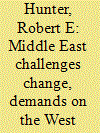

|
|
|
|
|
| Summary/Abstract |
Nearly 30 years after I wrote “US Interests and the Use of Force in the Middle East”, these aphorisms are a good starting point for assessing American interests and policies in the Middle East, including approaches to the use of force. I take some quiet pride that what I wrote back then stands up well – for that era. And in terms of analysis of American interests in the region – mutatis mutandis – it also stands up well, as do the precepts for judging policy alternatives. As of today, criteria for US use of force are close to what I perceived them to be in 1986 – though following two major detours, Afghanistan in 2001 and Iraq in 2003.
|
|
|
|
|
|
|
|
|
|
|
|
|
|
|
|
| 18 |
ID:
142898
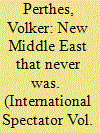

|
|
|
|
|
| Summary/Abstract |
How lucky the Middle East was, I thought as I re-read my International Spectator piece of 1996, when the worst nightmares of Arab opinion leaders were connected to the political risks involved in what seemed like an emerging new regional division of labour brought about by a peace treaty between Israel and its Arab neighbours. A substantial part of the Arab intellectual and political elites at the time feared that their countries would lose in relative terms, compared to Israel, if a comprehensive settlement of the decades-old Israeli-Palestinian and broader Arab-Israeli conflict were to lead to an economically integrated “New Middle East”.
|
|
|
|
|
|
|
|
|
|
|
|
|
|
|
|
| 19 |
ID:
142902


|
|
|
|
|
| Summary/Abstract |
The article by Robert Mundell, written on the eve of the establishment of the euro in May 1998, inevitably reflects his very optimistic and enthusiastic assessment of an event that seemed to confirm his own views about the evolution of the international monetary system. Mundell had in fact pioneered, already in the 1960s, analysis of the impact of monetary and fiscal policies in different exchange rate regimes, as well as analysis of “optimum currency areas”. When he was awarded the Nobel Prize in Economic Sciences in December 1999 for these very contributions to international economics, the media reported that the prize had been given to “the father of the euro”.
|
|
|
|
|
|
|
|
|
|
|
|
|
|
|
|
| 20 |
ID:
142886


|
|
|
|
|
| Summary/Abstract |
More than 30 years have passed since my essay in the early eighties sketched out Egypt’s sociological profile at the time. On looking at the Egyptian scene now one is struck by the transformational changes, especially in the political sphere, that witnessed armed insurgency and the economic crises of the 1990s and, with almost no predictions, the eruption of mass popular uprisings in which two presidents were toppled in 2011 and 2013. The Egypt of 2015, with its bursting population of nearly 90 million, has shown that it can surprise the world; today’s political and social dynamics give promise of fundamental new directions, and some worrying continuities.
|
|
|
|
|
|
|
|
|
|
|
|
|
|
|
|
|
|
|
|
|